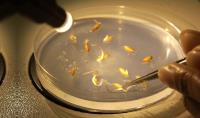 Add My Company
Add My Company
Sign In
Banking on Sterilization
02-10-2014

Astell’s Sales and Marketing Director, Dave Thomas, recently visited the Millennium Seed Bank Partnership at Wakehurst in West Sussex, to find out how an Astell autoclave is being used in the laboratory for essential sterilization processes.
Working to Preserve Biodiversity
To give you an idea of scale, the Millennium Seed Bank Partnership is the largest ex situ plant conservation programme in the world. Its focus is on global plant life faced with the threat of extinction and plants of most use for the future. The seeds that are saved are conserved in seed banks as an insurance against the risk of extinction in their native habitat, ensuring that they will be available for decades to come.
Working with a network of partners across 80 countries, over 13% of the world's wild plant species are now being stored at the Millennium Seed Bank, the aim being to save the seeds of 25% of the world’s plants by 2020. There is particular emphasis on the storage of those seeds at risk from the ever-increasing impact of human activities, including land use and climate change.
Frozen Assets
One of the key considerations when storing seeds is to ensure that they are still able to germinate after prolonged periods of inertia. The viability of the seed collections at the Millennium Seed Bank is assessed about one month after they are placed into the -20°C cold store; this establishes the 'initial viability' of the collection. Subsequently, collections are re-tested every five or ten years depending on whether they are expected to be short- or long-lived. This assessment of viability is extremely important, since if a high proportion of a particular seed type does not germinate, it may be necessary to collect further samples or consider alternative methods of storage.
Essential Sterilization
The Astell autoclave, an ‘Autofill’* version of the 63 litre Compact Benchtop model, is used to sterilize the Tissue Culture Media and Agar that is required for the germination tests. This is essential, since the presence of certain micro- organisms in the media could affect the ability of the seeds to germinate. A container of seeds for testing is removed from the cold room and allowed to warm up for one day in the adjacent drying room. Seeds are sown into Petri dishes containing the sterilized agar and then incubated at an appropriate temperature, depending on the local climate, where the collection came from and the time of year that germination would probably occur in the wild.
Each week the seeds are checked, and germinated ones are removed, recorded and discarded. The tests are checked in a clean air cabinet, to minimise the risks of inhalation of fungal spores produced by any mould on the seeds.
A germination test is the most reliable way to measure seed viability. It also provides valuable information that can be used in the future to turn the seeds into plants for reintroduction, restoration or research.
Keith Manger, Laboratory Manager at the MSBP points out that &qout;Approximately 20,000 germination tests are carried our every year at the MSBP, which of course means that the Astell autoclave is in constant use".
Protecting Biodiversity, Protecting the Environment
The other main application for the autoclave is the sterilization of potentially hazardous material. "The collection of seeds from around the world could result in the introduction of invasive plants and plant pests” says Keith, “so the Millennium Seed Bank Partnership houses a quarantine facility licenced by FERA (Food and Environment Research Agency). This inevitably means that ‘waste materials’ often need to be sterilized in the autoclave before being incinerated and disposed of".
Autoclaves – the Unsung Heroes?
In conclusion, although autoclaves are ‘utilitarian’ in comparison with many high-precision instruments now regularly used in science, steam sterilization still remains one of the most important and essential processes in the laboratory, and this is nowhere better illustrated than at the Millennium Seed Bank Partnership, where an autoclave makes a vital contribution to the invaluable work that is being carried out to conserve plant species throughout the world, and protect the environment.
*Note: Astell’s Compact "Autofill" autoclaves, are innovative, self-contained units requiring no connection to a water supply or drain, just a domestic-type power socket). Please click here for more information. All images used remain the property of the Millenium Seed Bank.
For more information on Banking on Sterilization talk to Astell Scientific Ltd
Enquire Now
List your company on FindTheNeedle.

